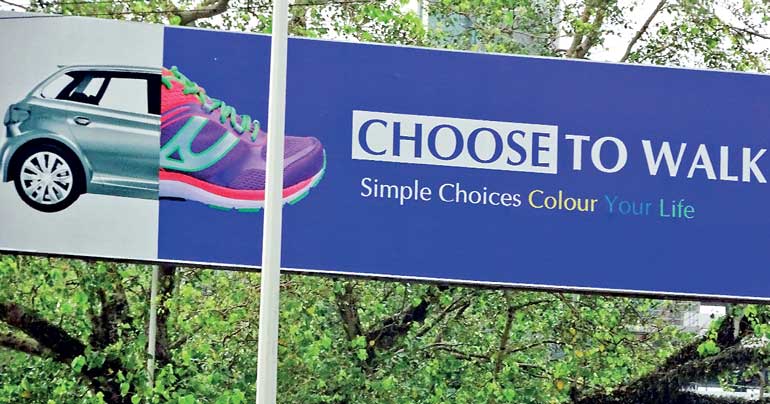Monday Feb 16, 2026
Monday Feb 16, 2026
Tuesday, 9 January 2018 00:00 - - {{hitsCtrl.values.hits}}

By Sajeeva Samaranayake
The English Judge Lord Denning was a rare professional. Whilst being a progressive judge, he also championed plain English and sought to make his judgments very clear and simple. He begins one of his books very characteristically by saying, “I have of course tried to make my meaning clear as that is something everyone who wishes to influence others must do.”
His attitude influences me, though I struggle to communicate. But the assumption of a British judge who had accepted and experienced the ‘white man’s burden’; a man for whom it was natural to ‘guide the world’, and ‘influence others’ is something I cannot share. In my mind it is transformed into a different question.
Can I influence myself? Can I speak simply to myself? Can I exercise authority over myself? Do I know how? Indeed, these are highly unusual questions, but not to be discarded for that reason.
We take this self for granted. We live in a world where there is a fundamental right to distractions. We escape the self all the time. The self is now reduced to a mere convenience. It is something which helps us to experience the world for better or for worse. What this self really is – we do not know.
I wonder why, when we started educating almost the entire world in the 20th century, and life was divided into subjects – why the self was left out? Is not this self – and I mean myself – yet another subject to be allocated some space in our formal and informal classrooms for study? Educationists are familiar with the saying ‘before you can teach John you must study John’. But they do not follow this. They have no ‘time’.
I look out of my window and I see a bird flying. I try to see how this simple act of seeing is actually dependent upon several things. It is dependent on sunlight; upon the coincidence of my sitting near the window and the bird appearing; upon my eye sight and finally upon my memory that helps me to recognise the bird. We are trained to see that the self is made up of things like this – moment to moment.
There are many things to learn from this. But let’s first appreciate the cooperative way that we act even when we think we are alone. This is why Rev. Martin Luther King said: “Before you have your breakfast you would have depended on half the world.”
This is actually true because every convenience that we rely on from water and electricity to food clothes and our shelter itself is the result of cooperation that extends a long way from our immediate loved ones to people near and far – seen and unseen, past and present. And we must have some gratitude to all of them. You can see that beyond the cash transaction there is an invisible network that is holding and protecting us…
In the school boarding we had this ritual where we prayed – “For what we are about to receive may the Lord’s name be praised!” It was a pause and in that pause, we were expected to reflect something deep. Probably we were expected to reflect on the reality of thirst and hunger and perhaps even dying from it unless we were provided for.
And so, in a fundamentally ordinary and simple way which responds to our humility at critical moments the jigsaw puzzle of life becomes real. It helps us to connect with and live those ideas like humanity, equality and inter-dependence which seem abstract and impersonal on print. It is when we engage our living flesh and blood that they can be personalised as a way of life. It is my firm belief that all religions and ways of life based on those religions direct us to this simplicity. This is a return to the very ground of our being through which the manifold concepts of a complex world can be personalised, moderated, integrated and made more useful to common humanity.
It is not difficult to see why we are struggling as a society to realise norms like equality and democracy which we are only talking about. Can we calculate the gains of individualism we made since 1977? As against this can we place the social collapse – within our families and within the wider family which is our political level? There is a story here that rupees and cents (and allegedly becoming a “middle income country”) will not tell us. But it is a story we are living every day.
From day break to dusk what are the rituals that we follow? How much quality time do we spend either alone or with others? Our homes and homemakers are neglected. Our children are given over to teachers who also neglect them. We hit the road and get stressed out because there are other stressed out motorists who want their way. We go to the super market and this becomes another selfish ritual to get your own things and get out as fast as you can. It gets repeated in workplaces and offices and factories and hospitals. All of us are basically on our own! Our cooperative rituals are few and far between and we have so little time to have a human conversation – to be honest and share our common misdemeanors, embarrassments and crimes to each other; to sing and dance and just forget ourselves.
Life remains a cooperative ritual all the same. We just need to see this and step out of this crazy race we have created. The speed, the cacophony of multiple noises and the complexity is killing the human being within. We have silenced the ‘powerless’ and are expecting the ‘powerful’ to do everything. True power lies in slowing down, silence and simplicity. These are the natural gifts of nature to the human being who can opt for a little bit of sanity; the inner wealth that creates true wealth outside.